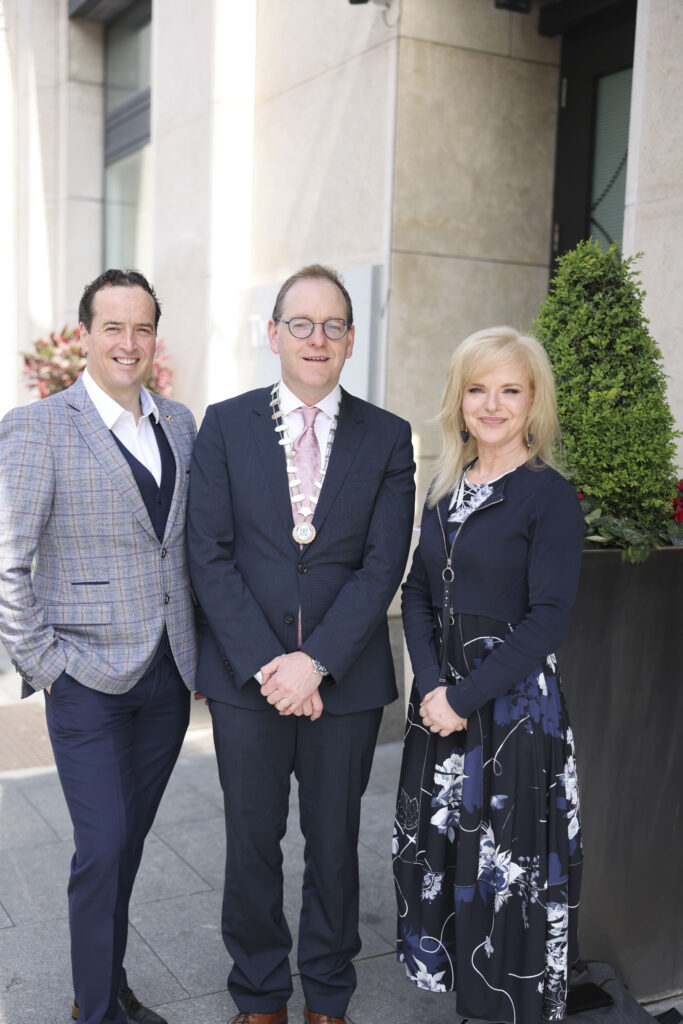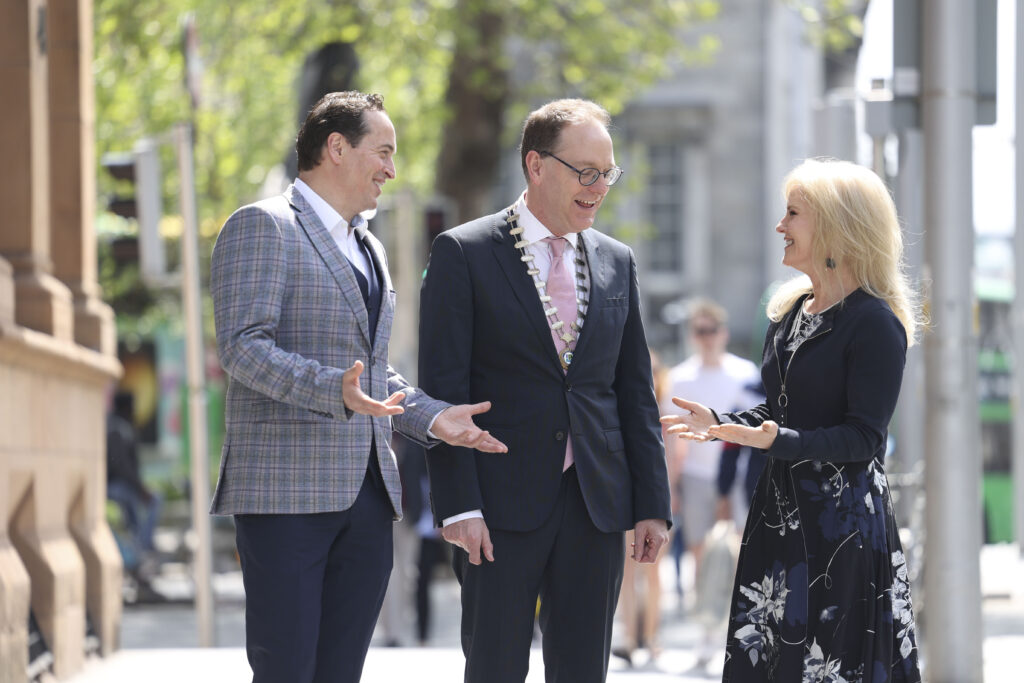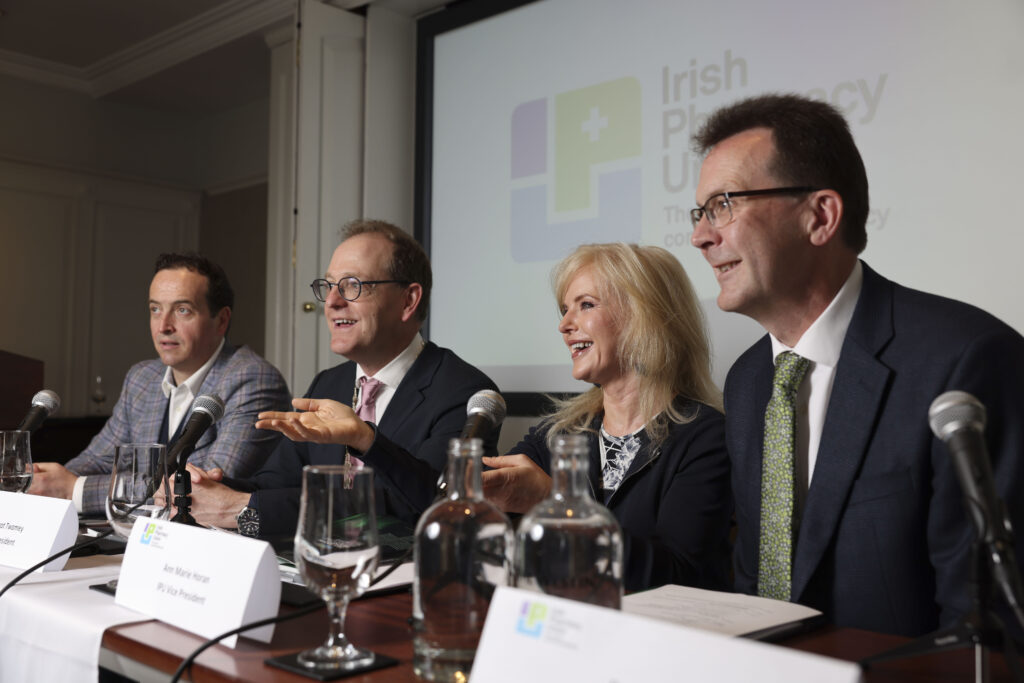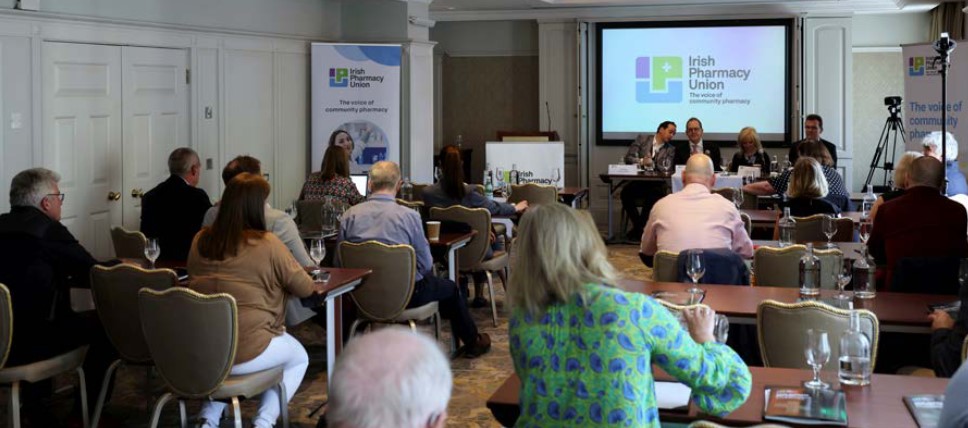Home » Report on IPU AGM 2023
The IPU AGM 2023 took place on Saturday, 13 May, and was carried out in a hybrid format for the second year in a row, with members attending both in-person and online through Zoom. In this article, Jim Curran, the IPU’s Director of Public Affairs and Communications, provides an overview of the AGM.

In total 46 members were in attendance at the 2023 AGM, 32 in person and 14 on Zoom. IPU President Dermot Twomey, IPU Vice-President Ann Marie Horan, IPU Honorary Treasurer Tom Murray, IPU Acting Secretary Derek Reilly and a number of IPU staff were gathered in the Westin Hotel, Dublin 2 along with an IT and AV team who were hired to run the event. IPU auditors JPA Brenson Lawlor were also present.
The Treasurer presented the financial report and consolidated accounts to the meeting, following which the accounts were adopted by the meeting and the auditors were re-appointed for a further year.
The Minister for Health, Stephen Donnelly TD, provided a pre-recorded video message to members present. As part of his message the Minister acknowledged the very significant role that pharmacists play in delivering healthcare for patients in communities across the country, and that this role was demonstrated starkly and powerfully during the pandemic.
The Minister said he wanted to further enhance the role of community pharmacy and develop opportunities including the introduction of a Minor Ailment Scheme, a medicine shortages protocol and to engage in a process that would allow pharmacists to provide contraception to patients without the need for a prescription.
He outlined that he wanted more enhanced community care and to create an environment that would have pharmacists central to this from a legislative, budgetary and working relationship perspective.
The IPU President Dermot Twomey then delivered his address to members in which he thanked them for their huge contribution to healthcare and patients over the last twelve months. As an example, he cited community pharmacy stepping into the breach and delivering 1.3 million COVID-19 vaccines to date, almost 11% of all vaccines administered; “This is a phenomenal achievement, given the lateness that the HSE sought to bring pharmacy into the vaccination programme and clearly proves the key role and accessibility of community pharmacies”, he said.
The President then pointed to one of the most pressing issues facing the sector, the current fee structure and the impact of it on sustainable service delivery. He informed those in attendance that since 2009, the amount paid to pharmacies per item dispensed has reduced by 19%, while the costs for dispensing medications on behalf of the state have increased by 23%: “This is entirely unsustainable and will soon reach the stage where it will cost more to dispense an item than what is paid by the state. In the same period the revenue to pharmacies for State schemes has reduced by 29%”.
“When it comes to reimbursement we have been roundly ignored and are expected to do more work for the state, for less money, while continuing to bare higher costs. All we are asking for is a viable fee and compensation arrangements and to be treated with the respect other healthcare professionals enjoy. This is not too much to ask.”
He acknowledged that the sector was at a crossroads and that the patience of pharmacists has been exhausted, and called on the Minister, the Department of Health and the HSE to stop the procrastinating and start pay talks as soon as possible.
As an example of what can be done in a collaborative manner, he referenced the fee that was agreed with the Department for delivering free access to contraception for women aged 17-26 years of age, a fee that reflects the professional role and administration of the pharmacist and wider pharmacy team; “It was a good example of how we can work together as partners with the Department and Minister Donnelly to ensure we can provide a good service to Irish patients. It is our intention to seek a similar process with the Department when they review our professional dispensing fees under the Public Service Pay and Pension Act.”

Honorary Treasurer Tom Murray, President Dermot Twomey and Vice-President Ann-Marie Horan
The President anticipated an intense period of activity over the next couple of months with regard to seeking fee restoration and warned that it will be a slow and difficult process, and at times there may be bumps in the road. If no progress is made by the start of June, he informed the meeting that the IPU will be commencing a strong and robust public awareness campaign, and called for members to support the campaign when it commences.
The shortage of pharmacists was highlighted as an area that remains a major concern. The President said that there is significant work happening in the background to try and address this ongoing issue. While he welcomed that the number of pharmacy student places available in Ireland is under review, he was concerned at the slow progress by the PSI on the implementation of the updated Third Country Qualification Route, and the lack of progress in resolving the known difficulty of applicants obtaining a visa for their adaptation period. He committed to continue pushing for progress in this area and maintain the pressure on the PSI.
Referencing the significant increase in the administrative load borne by pharmacists, the President informed the meeting that he was determined to continue to address the rapidly increasing bureaucracy and red tape imposed on the sector. He committed to working constructively with the PCRS and PSI to secure a reduction of the unnecessary bureaucracy in the community drug schemes, minimise the day-to-day bureaucratic workload on pharmacists, and seek that community pharmacies are appropriately reimbursed for the additional work they are inadvertently doing on behalf of the State.
The President then addressed the ongoing medicine shortages particularly those experienced in key therapeutic areas, such as HRT, Ozempic and antibiotics. He referenced a recent IPU survey which confirmed that 97% of pharmacists indicated that the situation has got progressively worse in the last 12 months. The meeting was informed that the IPU is working closely with all stakeholders to resolve the issue and that we would continue to strongly advocate that pharmacists should be given the authority to therapeutically substitute in instances of drug shortages.

Honorary Treasurer Tom Murray, President Dermot Twomey, Vice- President Ann-Marie Horan and Acting Secretary General Derek Reilly
Continuing his speech IPU President Dermot Twomey highlighted the success of the politician’s briefing day held in September 2022 with over 100 TDs and Senators present. This, he said, “provided us with the opportunity on behalf of the community pharmacy sector to highlight some of our critical concerns, including professional dispensing fees; pharmacist shortages; the call for the recruitment of a Chief Pharmaceutical Officer; and the expansion of pharmacy-based services including access to contraception, vaccinations, and minor ailments.”
“The success of this lobbying helped us obtain a meeting with the Minister for Health in November, where we discussed our key asks in more detail. Based on the concerns we raised with him he committed to doubling pharmacy places, explore the development of a Minor Ailment Scheme, and begin engagement on increasing the accessibility of the free contraception services through the introduction of a free contraception service through a structured pharmacist consultation,” continued Mr Twomey.
The political lobbying momentum continued with the IPU’s appearance in front of the Oireachtas Committee on Health in March this year. “This was a very good meeting, and it was instructive that the Committee endorsed the IPU’s call to make contraception more accessible and demonstrated a willingness to help advocate for the appointment of a Chief Pharmaceutical Officer in the Department of Health.”
The President then thanked the Vice-President Ann Marie Horan, Honorary Treasurer Tom Murray all the committee members and the staff of the IPU for their commitment and support over the last 12 months.
Finally, the President referred to the fact that this year marks the fiftieth anniversary of the founding of the IPU. He thanked the members of the IPU for their contribution in “progressing the agenda of the organisation and for their dedication and commitment in advancing the cause of pharmacy which underpins the proud tradition of unwavering support developed over fifty years.”
After the President concluded his address, the representatives of the IPU Committees including Liam Butler, Vice-Chair of the Pharmacy Contractors’ Committee, Jonathon Morrissey Chair of the Community Pharmacy Committee, and Tadhg Scanlan, Chair of the Employee Pharmacists’ Committee, presented their committee reports to the members in attendance.
When discussion and voting on the motions concluded, the members at the meeting participated in an open forum. A report on the motions is included on these pages.
The President closed the meeting at 5.00pm. A full report on the AGM, including the full speeches by the Minister for Health and IPU President, are available on the IPU website at ipu.ie > News and Publications > Events > IPU AGM 2023.
The motions, which had been circulated beforehand, were voted on using both the polls functionality within Zoom and by a show of hands in the meeting room in the presence of the auditors. Votes from Zoom and the room were then calculated to give a final number. There were 13 motions presented at the meeting including three polls to vote on the approval of the accounts and the IPU auditors, and individual polls representing each of the ten motions submitted in advance by IPU members. The voting options for each motion were labelled ‘For’, ‘Against’ and ‘Abstain’. For each motion, a slide appeared on the sAcreen clearly setting out the wording of each motion while proposers of the motions and responders spoke on the relevant issue. There were amendments to some motions and the wording below reflects the agreed wording for the final motions put forward for voting.
The voting was overseen by the auditors.
That this AGM calls on the Department of Health to fully fund through the HSE a national Disposal of Unused Medicine Properly (DUMP) campaign as per the recommendation in the National Hazardous Waste Management Plan (2021-2027) which states: “By 2023, establish a national collection of surplus and out-of-date medicines from household waste stream. Develop a proposal with options, building on experience with DUMP project; EPA characterisation report; and stakeholder input and to implement a nationwide collection system. This would include medicines and ancillary devices such as needles.
| % of members |
|
| For | 98% |
| Against | 2% |
| Abstain | 0% |
That this AGM calls on the HSE to ensure that patients and pharmacists are not negatively financially impacted when generic referenced priced medication is not available due to a shortage in the Irish market. The HSE and DoH should introduce mechanisms to ensure co-payments are waived in a timely manner when a generic referenced price medicine is in short supply.
| % of members |
|
| For | 100% |
| Against | 0% |
| Abstain | 0% |
That this AGM calls on the Department of Health and the HSE to introduce proactive measures to ensure continuity of medicinal products for Irish patients, and immediately call for an emergency mechanism where an administration code can be issued by the HSE in a timely manner for an exempt medicinal product, when the licensed medicine is in short supply thus reducing the administrative burden on community pharmacists and ensuring the timely access for patients to their essential medicines.
| % of members |
|
| For | 100% |
| Against | 0% |
| Abstain | 0% |
That the IPU proposes that pharmacy becomes the provider of choice for vaccination services as and when vaccination centres are wound down.
| % of members |
|
| For | 84% |
| Against | 11% |
| Abstain | 5% |
That the IPU explore with current IT providers a way of recording consultations in pharmacies. Using common read codes for interventions allows pharmacies to gather vital evidence of work currently being carried out in pharmacies. At present, much of this work is not properly or consistently recorded across the profession and it is therefore done without renumeration and prevents the commissioning of additional new services.
| % of members |
|
| For | 100% |
| Against | 0% |
| Abstain | 0% |
That the IPU calls on the PSI to immediately make the necessary legislative or regulatory changes that allow pharmacists to record by electronic means the movement of CD2 drugs in and out of their pharmacies.
| % of members |
|
| For | 98% |
| Against | 0% |
| Abstain | 2% |
This AGM calls on the IPU to review the annual contractor subvention.
| % of members |
|
| For | 9% |
| Against | 79% |
| Abstain | 12% |
That the IPU encourages pharmacies to become involved in the vaccination programmes.
| % of members |
|
| For | 100% |
| Against | 0% |
| Abstain | 0% |
That the IPU asks the Minister for Health to direct the NMIC to restore pharmacist access to the medicine’s enquiries service immediately in the interest of patient safety.
| % of members |
|
| For | 100% |
| Against | 0% |
| Abstain | 0% |
This AGM calls on the Minister and Department of Health to introduce a contraception provision programme to women, allowing them access contraceptives through a structured consultation with a community pharmacist, delivering equity of access and care.
| % of members |
|
| For | 90% |
| Against | 7% |
| Abstain | 3% |
The motions will be now discussed at the various committees and appropriate actions will be agreed and implemented.
Jim Curran

Director of Public Affairs and Communications, IPU
Highlighted Articles